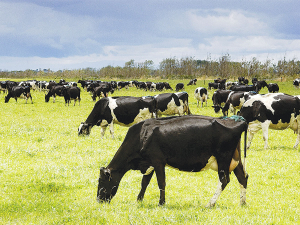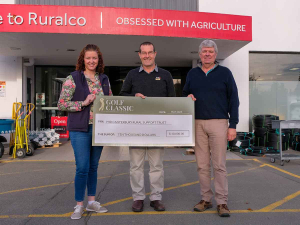Grass staggers (hypomagnesaemia – magnesium deficiency) or milk fever (hypocalcaemia – calcium deficiency) can affect beef cows around calving.
These diseases can be caused by both dietary factors and high levels of potassium in the soil.
While metabolic disorders in beef cows are typically associated with sudden changes in the diet or underfeeding, low levels of magnesium (Mg) or high levels of potassium (K) in the soil can also be causal factors.
Milk fever tends to manifest as a dull, lethargic cow lying prone and unable to stand. The symptoms of staggers can appear similar although it is common to see trembling or shaking with abnormal skin twitches.
Cows with staggers may also become uncharacteristically aggressive or begin to thrash around. Left untreated both conditions can lead to coma and death. Cows with milk fever are typically treated with calcium borogluconate solution given intravenously and/or subcutaneously, while cows with staggers respond to magnesium sulphate solution subcutaneously (never IV).
Most New Zealand soils have adequate magnesium (Mg). Up to 10kg/ ha/year is deposited in rainfall and sea spray on coastal areas, but pumice soils, such as those found on the volcanic plateau, have very little Mg so will need Mg fertiliser to overcome deficiencies.
To reduce the incidence of grass staggers, soil Mg test results of 20-30 are needed. Soil Mg levels should be monitored over time and maintenance dressings of 5-10kg Mg/ha/year applied. Fertiliser options to increase Mg levels include dolomite and serpentine super, although the latter is a slow-release option.
High soil potassium (K) levels can cause both grass staggers and milk fever. Potassium displaces Mg from exchange sites reducing Mg levels in plants and animals and this causes grass staggers. In these situations, supplementing cows with magnesium oxide before and after calving will alleviate symptoms.
High K levels will also restrict a plant’s ability to uptake calcium and therefore the absorption of calcium into the bloodstream. This can lead to milk fever in beef cows in late pregnancy or at calving.
Farmers should avoid grazing paddocks with high K levels around calving, as well as paddocks that have recently been dressed with potassic fertiliser. In practice, this means ideally applying potassic (K) fertilisers after calving.
It is recommended that beef cows not be given a calcium supplement precalving, as a high dietary intake of calcium can interfere with a cow’s ability to mobilise her own calcium stores. Calcium deficiencies are considered rare in NZ because of this country’s young soils and the supply of plant available calcium through super-phosphate and lime fertilisers.
Magnesium can be supplemented via magnesium oxide powder sprinkled on feed, or in severely deficient areas using a magnesium bolus.
Source Beef+Lamb NZ



















